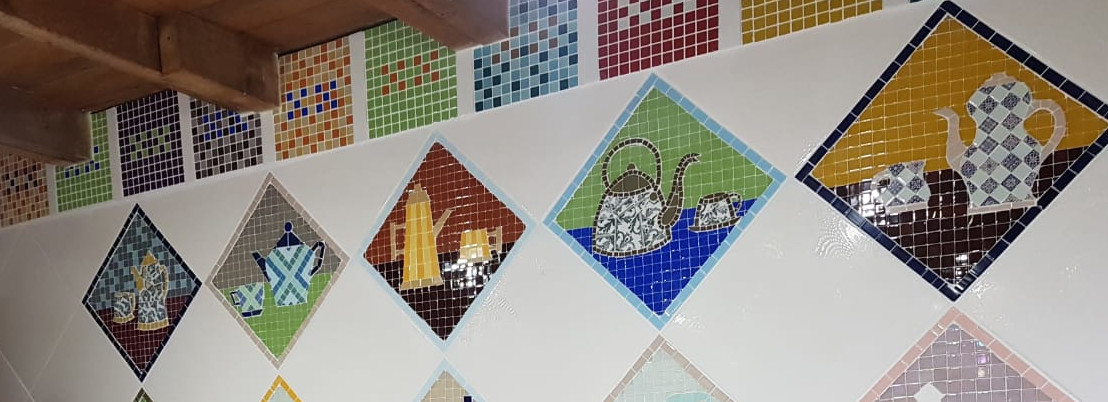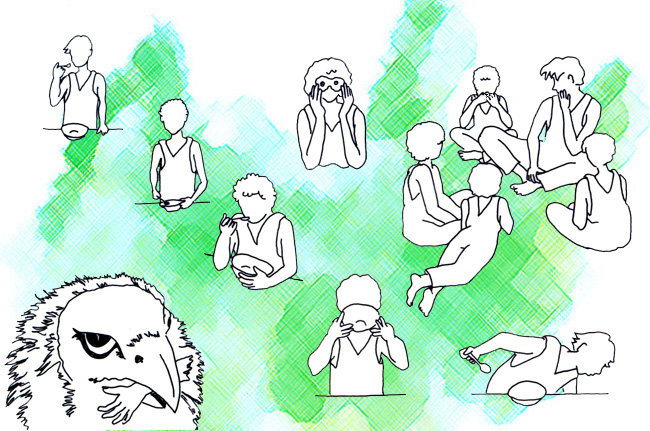6. The food
Translated by Angela Telles-Vaz
Proofread by Izabel Arocha
After we left the nightmare, Geraldo always said with a smile that the food was rice and beans for lunch and beans and rice for dinner. It was easy to laugh later. But he didn’t lie.
In the morning we were given a bowl of cornmeal. I have no idea about anything beyond that. How many times the porridge had an unbearable taste of kerosene! It was nauseating at the beginning, horrible later, then strong and finally just a taste of the kerosene. On one occasion, a student said that the general supervisor while visiting the kitchen caught the cook drooling into the porridge pot. I think it was overstated. It was enough the taste of kerosene. I ask now, that taste of kerosene was incompetence or malice? Did it happen by chance or was it a provocation to reduce the capacity of our resistance? For sure it was some kind of an accident. The cook was a little old man, I remember him because of the drooling. Was it because of the memory of the student accusing him that made me think he was an old man?
From Monday to Saturday, we had rice and beans for lunch and dinner. On Sundays we found on the plates (small aluminum bowls, the bowls for the bigger boys were clean and shiny), on Sundays a piece of lamb of the size of a small lime was found. People said that every week a lamb belonging to the priest was slaughtered. Inevitably I suppose, every Sunday there it was, the piece of lamb of the size of a little lime. Would it be possible, by its size, to calculate the number of students? Very complicated!
Some round seeds always emerged in the middle of the rice, disgusting and of an unpalatable taste.
Sometimes, noodle soup was served. Thick noodles loose in water and an unfortunate boy, one of the older ones, shouted he would not eat that because the last time he did it, he found a spider egg inside the thick noodle. How did he know that it was from a spider?, I ask now. It was necessary to cut the noodle with a spoon and look for the egg; if it wasn’t found, it was slowly chewed, frightened of hearing the crack. Luckily the soup was thin and we had it very seldom. And a day came when someone said that the spider egg story was told so we wouldn’t eat the soup that the older would eat.
Well. During a holiday they gave us oranges. Someone shouted, bowls full of oranges would come up, everybody lined up. Each one received his orange and then spread out, peeling it with the teeth, hurting the lips with the acid juice. The peel enabled many games. We did reading glasses and squeezed them on the eyes of the ones unaware. We would make the orange last the longest, it was looked at, licked, chewed with the tongue and the slices finally swallowed with a pity taste. The rest of the day was bright and full of songs. The miracle happened twice during those approximately twenty months. One orange! It was for sure a holy day. Who would be the two miracle saints? It wasn’t and this I do know, it wasn’t the birth of god. No! For that they set apart for us a sweet milk cream and, I kept a bitter and painful chapter about it more at the end.
I also remember the mangoes. I don’t know if many or only a few. I remember only one of them. I have an impression that this fact repeated itself but a really clear scene I only remember one. Someone got a mango. A circle of gazers closed around him and the elected one licked it up with pleasure, slowly, with lips and hands yellow. The smarter one shouted, give it to me when you throw it away, then another one quickly, give it to me when you don’t want it anymore, after to me too, me too, me too and then, a sort of line was made. Tired of enjoying himself alone, the owner of the mango passed the fruit over with the pulp still full of juice and the second priest continued the service, drooling in the middle of mass, while the chief priest stood back to be able to lick his fingers stained with gold. The third boy caught whiter shreds still juicy. It didn’t last him long for the neighbor’s eyes, next in line, stared at such a betrayal. He would hand out the pit shredded which was white and already dried. Was it still juicy? Yes, of course, because the next boy smiled and swallowed deeply his own saliva.
Would my memory have erased some lettuce leaf or a piece of potato? No. I’m positive that I have not eaten anything different while I was there. If the miracle had occurred it would have marked with fire letters on the stone belonging to the bearded man. For, as there are the two oranges and the mangoes, oddly, there are the slices of the raw cassava. We never ate cooked cassava; expressing myself better, I don’t remember we ate cooked cassava. But I do remember that a student, the cook’s assistant, used to take outside pieces of rotten raw cassava. It was of a bright white pulp with little purple veins along the portion. I got these cassavas occasionally. It seems that someone from Geraldo’s class was for a certain time a helper in the kitchen. We ate carefully the white part, nasty sweet, and if by any chance, bit the purple part, we would soon feel the tongue bitter and sour. When the white piece was over, we began to nibble at the parts less rotten, becoming accostumed to the changes of taste. Until finally we ate everything else, either purple or with bad taste, showing a face of disgust.
Aside from that, there was the custom of having bags of food. It’s very hard to explain but I’ll try.
We had needdles. I’ll tell in a while how they were made. For now, let’s just say that we had needles. We sewed some small pieces of cloth (my god! from where did they come from?), using threads unwoven from the overalls and with refinement, a little bag was made. It had a hem and inserted in it a string that fastened the bag and was used as a handle. I never got to do that because the result was disgusting. The bag was hung at the waist, inside the clothes. During meals it was filled with leftovers. And that’s how it was kept until it was time to go to the dorm. The movement done by walking transformed the rice and beans into a brown paste of very strong smell. That’s what they ate when darkness fell. I’m sure that the food, or the bag that kept it, in the jargon of the school, had a special name. I don’t remember the word.
There was a story about it. One of the students had filled the bag too much and after the meal everybody had to march. The dough went to and fro, something huge went in and out between the legs, where the student should not have more than the natural flesh. The supervisor told him to get out of the line, take off his pants and, after all the embarrassment in front of every one, he had to give his hands to be paddled. The paddle was full of little holes to be more hurtful. That paddle will be in use many times.
In ancient Rome, the students were struck with a paddle:
Non laboras, vapulas.
This was at least, a thousand nine hundred and some more years of our civilization. Civilization…
There’s only one episode yet to be recorded. I talked about the row of faucets where water was drunk from and feet were washed.
In one occasion, there was no water. Something happened and the water stopped running. Who found out that there was water inside the cistern? It was extremely hard to climb up the toilet walls. At first, we still remembered to replace the cover. Then, not anymore. It was enough to climb up the wall with one cupped hand while the other held on to it not to lose balance.
The water was heated by the sun, yellowish, and tasted like rust. Or, it had a rusty smell.
During wartime, this kind of water is probably drunk.
to be continued on next sunday.

